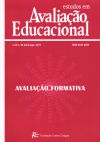Prova: instrumento avaliativo a serviço da regulação do ensino e da aprendizagem
DOI:
https://doi.org/10.18222/eae224920111975Keywords:
Avaliação Formativa, Regulação Escolar, Avaliação da Aprendizagem, TestesAbstract
Este artigo tem por objetivo analisar as possibilidades das provas serem implementadas na perspectiva de uma avaliação formativa. Visando não só a coletar dados, mas também a buscar alternativas que pudessem colaborar, a pesquisa focou a reconstrução da prova tanto no discurso docente como na prática pedagógica. A pesquisa foi realizada com educadores atuantes nos anos finais do ensino fundamental e médio. Com esses professores foram aplicados questionários, realizadas entrevistas, observação participante e oficinas pedagógicas. Os resultados apontaram que a falta de conhecimento e de orientações ao professor contribuem para que a prova, na quase totalidade das vezes, continue sendo utilizada como instrumento burocrático e das si fica tório. Esta nova perspectiva contribui para diminuir o fracasso escolar, uma vez que, se o professor utilizar a prova como ferramenta formativa, o aluno poderá superar obstáculos, aperfeiçoar seu percurso e construir sua aprendizagem de forma mais significativa.Downloads
Downloads
Published
How to Cite
Issue
Section
License
Authors who publish in this journal agree to the following terms:
a. Authors retain the copyright and grant the journal the right to first publication, with the paper simultaneously licensed under the Creative Commons Attribution License (CC BY 4.0) license that allows the sharing of the paper with acknowledgment of authorship and initial publication in this journal.
b. Authors are authorized to assume additional contracts separately, for non-exclusive distribution of the version of the paper published in this journal (for example publishing in institutional repository or as a book chapter), with acknowledgment of authorship and initial publication in this journal.
c. Authors are allowed and encouraged to publish and distribute their paper on-line (for example in institutional repositories or on their personal page) at any moment before or during the editorial process, as this can generate productive changes, as well as increase the impact and citation of the published paper (See The Effect of Open Access).







